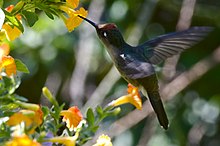| Tolima blossomcrown | |
|---|---|

| |
| Conservation status | |
 Vulnerable (IUCN 3.1) | |
| CITES Appendix II (CITES) | |
| Scientific classification | |
| Domain: | Eukaryota |
| Kingdom: | Animalia |
| Phylum: | Chordata |
| Class: | Aves |
| Clade: | Strisores |
| Order: | Apodiformes |
| Family: | Trochilidae |
| Genus: | Anthocephala |
| Species: | A. berlepschi |
| Binomial name | |
| Anthocephala berlepschi Salvin, 1893 | |

| |
The Tolima blossomcrown (Anthocephala berlepschi) is a Vulnerable species of hummingbird in the "emeralds", tribe Trochilini of subfamily Trochilinae. It is endemic to Colombia.
Taxonomy and systematics
The Tolima blossomcrown was originally treated as a subspecies of what was then the blossomcrown (Anthocephala floriceps), that also included what is now the Santa Marta blossomcrown. A study by Lozano-Jaramillo et al. published in 2014 found that the two differed greatly both genetically and in their climatic niches. The South American Classification Committee of the American Ornithological Society and worldwide taxonomic systems soon adopted the split; the Santa Marta blossomcrown retained the "parent's" binomial A. floriceps. The Tolima blossomcrown is monotypic.
Description
The Tolima blossomcrown is about 8.4 cm (3.3 in) long. Both sexes have a straight black bill. The adult male has a buffy white forehead, a rufous chesnut hindcrown, mostly shining green upperparts, and a rusty lower back and uppertail coverts. Its underparts are grayish buff. Its tail is bronzy green with wide white tips to the feathers, and all but the central pair of feathers also have a black bar near the tip. Females and immatures are similar to the adult male but their whole crown is brownish.
Distribution and habitat
The Tolima blossomcrown is found in Colombia's upper Magdalena River Valley where it flows through Cauca, northern Huila, Tolima, and Quindío departments. It inhabits the interior and edges of humid primary forest and mature secondary forest between elevations of 1,200 and 2,500 m (3,900 and 8,200 ft).
Behavior
Movement
The Tolima blossomcrown is assumed to be sedentary, but its possible seasonal elevational movements have not been studied.
Feeding
The Tolima blossomcrown's foraging strategy and diet have not been studied. It is believed to forage low in the forest understory like the Santa Marta blossomcrown.
Breeding
The Tolima blossomcrown's breeding phenology has not been studied.
|
Songs and calls Listen to Tolima blossomcrown on xeno-canto |
Vocalization
The Tolima blossomcrown's song is "a long series of repeated tsip notes".
Status
The IUCN has assessed the Tolima blossomcrown as Vulnerable. It has a small range and its population of fewer than 4500 mature individuals is believed to be decreasing. Much of its former habitat has been cleared for agriculture, and remaining forest is fragmented. It does occur in two national parks.
References
- ^ BirdLife International (2020). "Tolima Blossomcrown Anthocephala berlepschi". IUCN Red List of Threatened Species. 2020: e.T154809350A176036352. doi:10.2305/IUCN.UK.2020-3.RLTS.T154809350A176036352.en. Retrieved 5 August 2022.
- "Appendices | CITES". cites.org. Retrieved 2022-01-14.
- ^ Gill, F.; Donsker, D.; Rasmussen, P., eds. (January 2022). "Hummingbirds". IOC World Bird List. v 12.1. Retrieved January 15, 2022.
- ^ HBW and BirdLife International (2020) Handbook of the Birds of the World and BirdLife International digital checklist of the birds of the world Version 5. Available at: http://datazone.birdlife.org/userfiles/file/Species/Taxonomy/HBW-BirdLife_Checklist_v5_Dec20.zip retrieved 27 May 2021
- Lozano-Jaramillo, M.; Rico-Guevara, A.; Cadena, C.D. (2014). "Genetic differentiation, niche divergence, and the origin and maintenance of the disjunct distribution in the Blossomcrown Anthocephala floriceps (Trochilidae)". PLOS One. 9 (9): 3108345.
- Remsen, J. V., Jr., J. I. Areta, E. Bonaccorso, S. Claramunt, A. Jaramillo, D. F. Lane, J. F. Pacheco, M. B. Robbins, F. G. Stiles, and K. J. Zimmer. Version 24 July 2022. A classification of the bird species of South America. American Ornithological Society. https://www.museum.lsu.edu/~Remsen/SACCBaseline.htm retrieved July 24, 2022
- Clements, J. F., T. S. Schulenberg, M. J. Iliff, S. M. Billerman, T. A. Fredericks, J. A. Gerbracht, D. Lepage, B. L. Sullivan, and C. L. Wood. 2021. The eBird/Clements checklist of Birds of the World: v2021. Downloaded from https://www.birds.cornell.edu/clementschecklist/download/ Retrieved August 25, 2021
- ^ Züchner, T., E. de Juana, P. F. D. Boesman, and C. J. Sharpe (2020). Tolima Blossomcrown (Anthocephala berlepschi), version 1.0. In Birds of the World (S. M. Billerman, B. K. Keeney, P. G. Rodewald, and T. S. Schulenberg, Editors). Cornell Lab of Ornithology, Ithaca, NY, USA. https://doi.org/10.2173/bow.tolblo1.01 retrieved August 5, 2022
| Taxon identifiers | |
|---|---|
| Anthocephala berlepschi | |
